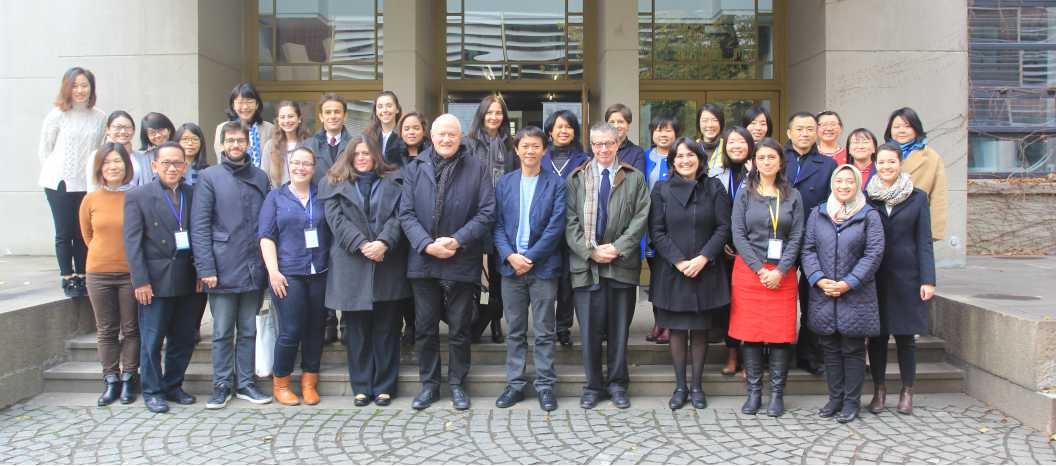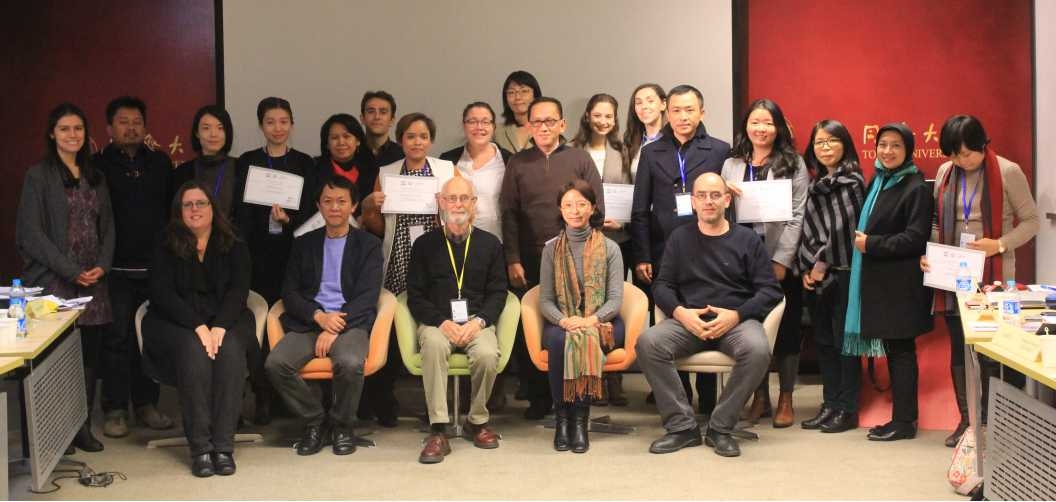December 2015
Asia-Pacific Region Training on HUL
The Asia-Pacific Region Training on HUL was held at the WHITRAP Shanghai offices between 14-17December 2015. Within the framework of the Agenda 2030 and the Sustainable Development Goals, this course aimed to reflect on the “what, why, and how”of the HUL approach, along with the latest developments in the field, as well as was pursued to strength and enlarge the specialist network for HUL in the Asia-Pacific Region.


During the four-day training programme, practitioners and specialists participated in lectures, a field visit to Tongli Town and a round table of discussion on the challenges and impacts of the HUL approach. These activities were led by Chinese, regional, and international experts in the field. Among others, Zhou Jian (Director of WHITRAP-Shanghai and Professor of Urban Planning at Tongji University), Francesco Bandarin (UNESCO Assistant Director-General for Culture), Shao Yong (Executive Director of WHITRAP-Shanghai and Professor of Urban Planning at Tongji University), Han Feng (Director of Department of Landscape Architecture, Tongji University), Ken Taylor (Adjunct Professor at Australian National University), Cristina Iamandi (Conservation Architect and Urban Planning Consultant), Ana Pereira Roders (Assistant Professor at Eindhoven University of Technology), Susan Fayad (Coordinator Heritage Strategy for the City of Ballarat, Australia), Giulio Verdini (Co-Director of Research Institute of Urbanisation of Xi’an Jiaotong-Liverpool University) and Harry Den Hartog (Professor at Tongji University), who presented the HUL approach and its tool Kit implementation.
ANNOUNCEMENT
2015 WHITRAP Asia-Pacific Region Training on HUL
Shanghai, China, 14-17 December 2015
Application Deadline: October 15, 2015
The 2015 WHITRAP Asia-Pacific Region Training on HUL aims to update professionals on the what, why & how of HUL with the latest developments in the field. Furthermore, through this training course, WHITRAP pursuit to strength and enlarge the specialist network for HUL in this area of the world as well as its implementation and its capacity building programme. During four days training programme, practitioners and specialists will participate in lectures, field trip visits and roundtable discussion on HUL approach challenges and impacts in Asia-Pacific Region. All of them will be led by Chinese, Regional and International experts. Among others, Francesco Bandarin (UNESCO Advisor and Former Director of the World Heritage Centre), Susan Fayad (Coordinator Heritage Strategy for the City of Ballarat, Australia), Ken Taylor (University of Canberra) and Giulio Verdini (Director Research Institute of Urbanisation of Xi’an Jiaotong-Liverpool University -XJTLU-) will present the HUL approach and its Took Kit.
Teaching Team
The teaching staff is composed by experts on the field heritage conservation and HUL approach:
- ZHOU Jian (Director of WHITRAP Shanghai and Professor of Urban Planning at Tongji University),
- SHAO Yong (Executive Director of WHITRAP Shanghai and Professor of Urban Planning at Tongji University),
- Fancesco BANDARIN (UNESCO Advisor and Former Director of the WHC),
- Susan FAYAD (Coordinator of Heritage Strategy for the City of Ballarat, Australia).
- Ken TAYLOR (University of Canberra)
- Giulio VERDINI (Director of Research Institute of Urbanization of Xi’an Jiaotong-Liverpool University -XJTLU-)
Teaching Materials
- Reader for the overall subject and more specific components of HUL
- Historic Cities brochure
- WHITRAP HUL programme HUL Brochure
Working Language
English
Certificate
Certificate of participation of the 2015 WHITRAP Asia – Pacific Region Training on HUL, Shanghai, China, 14-17 December 2015. Participants are requiring assisting to all of the lectures and sessions of the training course.
Course Fee
USD 200
Participants will be responsible for their round trip travel costs to and from venue location, accommodation and living expenses. In order to cover accommodation and living expenses during the time of the course, participants should plan for a minimum allowance of 800 USD for the entire period.
Scholarship
Scholarships available: 2 (only for subscription fee)
The organizers only offers limited scholarships to the professionals/ decision makers/ cultural heritage promoters with exceptional profile and who can demonstrate that will carry out an HUL application.
Application
Preference will be given to applicants working in Asia-Pacific Region
Please COMPLETE the attached application form and send it together with the following materials by email to the contact address below:
- One essay of 2 pages, about how can HUL approach contribute to the conservation processes in the applicant’s region? Give specific examples and possible cases for HUL application.
- Framework of Research (conceptual map)
- Motivation Letter
- CV
- Endorsement of the Organization where the potential participant works
Announcement of the participants selected will send to the personal email of applicants within the next three weeks after the deadline.
Correspondence
All correspondence concerning the above course should be addressed in English to: whitrap.hul@gmail.com
December 2014
International Symposium & Training Course on the Historic Urban Landscape Shanghai, 7–10 December 2014.
The Historic Urban Landscape (HUL) is an updated heritage management approach based on the recognition and identification of a layering and interconnection of values – natural and cultural, tangible and intangible, international as well as local – present in any city. It is also based on the need to integrate the different disciplines for the analysis and planning of the urban conservation process, in order not to separate it from the planning and development of the contemporary city. The Recommendation on the Historic Urban Landscape, an international policy instrument adopted by UNESCO’s General Conference on 10 November 2011。
Following an international Expert Meeting that was organized by WHITRAP in Shanghai, in October 2012, a ‘Road Map’ for the application of the HUL approach in China was developed and a HUL implementation programme established. In association with the World Heritage Centre, WHITRAP’s HUL implementation programme covers the Asia-Pacific region as well as other geo-cultural regions of the world. The December 2014 International Symposium aims to bring together the implementing agencies and partners, as well as interested professionals from China and abroad, to take stock of progress made in HUL implementation in a diverse range of contexts.
November 2013
WHITRAP’s Domestic Training Course on HUL (Shanghai)
From 8 to 12 November 2013 WHITRAP organized a Domestic Training Course on Historic Urban Landscapes in Shanghai aimed at mid-career Chinese professionals to inform them of and work through the concept, approach and implementation of HUL in China. Twenty one participants were enrolled in the course, coming from Colombia, Hong Kong, Macau, Beijing, Shanghai, Nanjing and Suzhou and Tongli (all three from Jiangsu Province), Hangzhou and Xitang Town (both from Zhejiang Province), Lijiang (Yunnan Province), Jinan (Shandong Province) and Jinzhong (Shanxi Province). The outcomes of the discussions within the training course will be included in the Special Programme on HUL, which is developed and implemented by Tongji University’s Advanced Research Institute for Architecture and Urban-Rural Planning and WHITRAP.
October 2012
International Expert Meeting: Developing a Road Map for the Application of HUL in China (Shanghai)
From 12 to 14 October 2013 an international Expert Meeting was organized by WHITRAP in Shanghai to discuss the development of a critical path, a ‘Road Map’, for the application of the HUL approach in China. Invited participants came from different international institutions, such as the Cultural Relics Protection and Archaeology Department of the State Administration of Cultural Heritage (SACH), the China Academy of Urban Planning and Design in Beijing, the School of Architecture of Tsinghua University (Beijing), the School of Architecture of Southeast University in Nanjing, the College of Architecture and Urban Planning of Tongji University (Shanghai), the UNESCO Cluster Office in Beijing, United Nations Development Programme (UNDP), International Centre for the Study of Preservation and Restoration of Cultural Property (ICCROM), the Bezalel Academy of Arts and Design in Jerusalem (Israel), the University of Paris I–Sorbonne in Paris (France), the Brandenburg Technical University in Cottbus (Germany) and the American Planning Association (United States).


 Application Form - 2015 WHITRAP Asia – Pacific Region Training on HUL Shanghai, China,14-17 December
Application Form - 2015 WHITRAP Asia – Pacific Region Training on HUL Shanghai, China,14-17 December